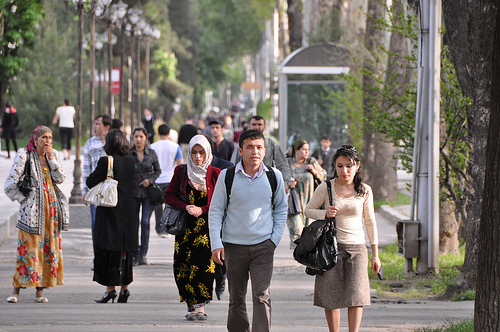 The government of Tajikistan has little faith in the quality of education students receive at Tajik universities. Tajikistan‘s quality of education has suffered since the early 1990s when the country first gained independence from the Soviet Union and soon after descended into a civil war that lasted from 1992 until 1997. Despite ongoing efforts by the government to improve the country’s educational system, little progress has been made.
The government of Tajikistan has little faith in the quality of education students receive at Tajik universities. Tajikistan‘s quality of education has suffered since the early 1990s when the country first gained independence from the Soviet Union and soon after descended into a civil war that lasted from 1992 until 1997. Despite ongoing efforts by the government to improve the country’s educational system, little progress has been made.
Job postings issued by City Hall in the capital city of Dushanbe state that “preference will be given to graduates of Tajik universities who received their diplomas before 1992, or to graduates of foreign universities.”
This statement illustrates the government’s concern with the quality of education college students have received ever since the country achieved independence in 1991. Higher education in Tajikistan suffers from a shortage of qualified personnel and a lack of sufficient training among existing instructors. These institutions have also been plagued by corruption. Not only do students commonly pay bribes to gain entrance to state universities, but they also pay instructors for passing entrance exam scores and for passing grades.
“Our students are very weak in terms of the knowledge they receive. Those who have the money can easily afford enrollment in any university, but the smart guys who cannot afford this remain unable to master their area of study,” says Oynihol Bobonazarova who runs Perspective-Plus, a legal-support clinic in Dushanbe.
To address the problem, the Tajik government has created legislation to improve and develop the country’s college education system. These laws specifically aim to give women equal access to education, improve the training and qualifications of academic staff, and make Tajik universities more competitive internationally. With these goals in mind the government has proposed many educational reforms, but change has been slow and limited in the extent to which it has positively impacted the quality of education college students receive.
Since Tajikistan gained independence, the number of higher education institutions and student enrollment figures have steadily grown. While there were 13 institutions of higher learning in 1991, by 2012 that number had increased to 30. Similarly, the number of enrolled college students has grown from 127 per 10,000 citizens in 2001 to 214 in 2007. Although these statistics indicate greater access to college education, without quality instruction the education these students receive will continue to hold little value to future employers.
Another concern is that college age students lack the incentive to seek higher education. A survey conducted in 2012 showed that only 25% of Tajiks believed that higher education was necessary and beneficial. Many young adults instead choose to prioritize work over education so that they can help their family financially.
Creative Commons Love: Veni Markovski on Flickr.com
Written by Amanda Lubit